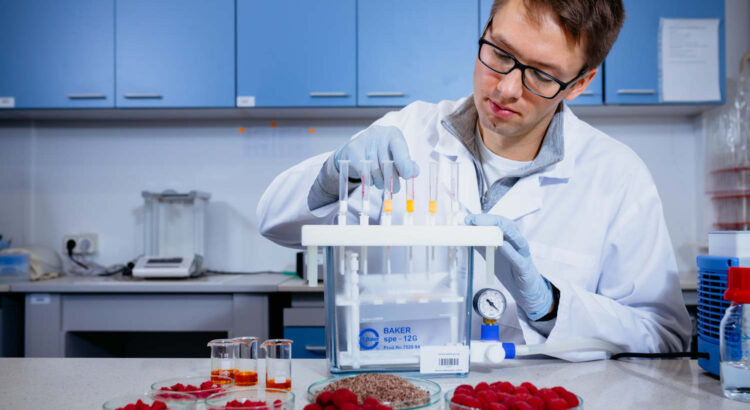Raspberries contain high levels of antioxidants, which help protect the human body against many diseases, including cancer. Research by Bartosz Fotschki, PhD, from the Institute of Animal Reproduction and Food Research of the Polish Academy of Sciences in Olsztyn, has shown that in order to boost the pro-health effect of antioxidants from raspberries, combining them with prebiotics is recommended.
– Appropriate stimulation of intestinal bacteria, through prebiotic supplementation, increases the efficiency of the breakdown of raspberry polyphenols into chemical compounds with greater pro-health potential, e.g. with a beneficial effect on fat metabolism in the liver – emphasises study author Bartosz Fotschki, PhD, from the Department of Biological Function of Food of the IARFR PAS in Olsztyn.
A FEW WORDS ABOUT RASPBERRIES
Raspberries are one of the most popular fruit. They owe their success not only to their sweet, juicy taste, but also to their well-known pro-health properties.
As Bartosz Fotschki reminds us, these fruits are a rich source of bioactive compounds with strong pro-health potential, e.g. characterised by a high content of antioxidants, mainly phenolic compounds, e.g. cyanidins, anthocyanins, elagotannins and phenolic acids. Antioxidants are natural substances that can help protect the human body against the development of many diet-related diseases.
– In addition to their strong antioxidant properties, the polyphenolic compounds found in raspberries also exhibit other beneficial biological activities, including regulating inflammation, lipid metabolism, bile acid synthesis in the liver and the activity of the microbiota in the gastrointestinal tract – indicates the scientist, who is involved in exploring the pro-health properties of biologically active compounds towards the prevention and alleviation of diet-induced metabolic disorders (e.g. obesity, non-alcoholic fatty liver disease).
BOOST THE EFFECT
The pro-health effects of raspberries can be further enhanced, which is why Bartosz Fotschki examined how to influence the gastrointestinal bacteria to do more intensive 'work’ in breaking down the polyphenols from raspberries.
In his research, the scientist relied on the combination of a raspberry polyphenol preparation with the prebiotic effect of fructooligosaccharides (these are fibre products that support the growth of probiotic bacteria, which are essential for proper intestinal function).
– The results of the study confirmed an enhancement in the efficiency of metabolising polyphenols to chemical compounds with greater pro-health potential. The mechanism of action of this mixture combines an increase in the number of bacteria showing the ability to metabolise polyphenols in the gastrointestinal tract with an increased concentration of metabolites that reach the liver and regulate mechanisms related to lipid metabolism, oxidative stress and inflammation – the scientist points out.
The results of the research have been published in one of the leading journals in the discipline of food technology and nutrition: Food Research International.
In other words – by combining the consumption of raspberries with a prebiotic supplement, we boost the pro-health effects of the fruit, and this has a beneficial effect on liver metabolism, among other things.
– Further human studies are still needed, but the combination of polyphenols found in various products (e.g. juice, mousse, freeze-dried) with fructooligosaccharides could be a valuable dietary supplement to support health prevention and could already appear in many products with pro-health potential – concludes Dr. Fotschki.
The study was carried out as part of the project 'Raspberry polyphenols and their metabolites as regulatory factors in the mechanisms of non-alcoholic fatty liver disease’ (UMO-2018/31/D/NZ9/02196), funded by the National Science Centre.
